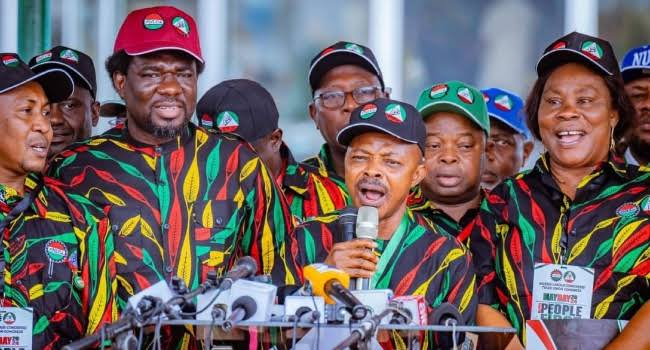•By Taiwo Olapade
Barring any last-minute intervention by the Federal Government, the nation may be thrown into an indefinite industrial action if the Labour Union makes good on its threat to down tools.
The Nigeria Labour Congress and the Trade Union Congress, at an emergency meeting in Abuja last Friday, announced the indefinite strike action to begin on Monday, June 3rd, 2024, due to the failure to reach an agreement with the Federal Government on the new minimum wage for workers.
Major labour bodies, including PENGASSAN, NUPENG, Maritime, and the Electricity workers, have all endorsed the strike with a promise to bring socio-economic activities in the country to a standstill.
After several days of tripartite meetings, the Federal Government agreed to pay a new minimum wage of #60,000, while the Labour Union reduced its initial demand from #615,000 to #494,000.
According to the leadership of the Labour Union, Comrades Joe Ajaero and Festus Osifo, the indefinite strike action was also to protest the refusal of the federal government to revert to the old prices of electricity tariffs in the country.
You will recall that the National Electricity Regulatory Commission (NERC) announced an increase in the electricity tariff in April this year, which attracted wide criticism and outright rejection by Nigerians. However, the Minister of Power, Adebayo Adelabu, while appearing before the House of Representatives Ad hoc Committee on the issue, insists that failure to increase the tariff may cause an energy crisis in the country.
According to him, electricity consumers in Nigeria still enjoy unrivaled subsidies from the government more than any other country in Africa.
Minister Adelabu also justified the over 300 percent increase by saying that the nation’s megawatts had increased to about 5,000, which he said is responsible for the regular supply of electricity to consumers, especially those on Band A.
Sadly, the Minister could not provide a convincing answer to millions of Nigerians who are being ripped off their hard-earned money under the Estimated Billing debacle.
Relatively, the supply of electricity has improved in many areas nationwide according to reports, but there are still millions of consumers who live in darkness for months due to faulty transformers and lack of connection to the national grid. Minister Adelabu, please give them your utmost attention now.
Coming back to the issue of the minimum wage, the last one implemented under former President Buhari’s government was N30,000, which many state governments failed to implement. It lapsed in May this year after five years.
During a session yesterday with Governor Alex Otti of Abia State, his counterpart from Bauchi, Senator Bala Mohammed, appealed to the Labour Union to rescind their decision, adding that any strike now could cripple the nation’s economy. He also said that a strike will inflict more hardship on the people.
Governor Bala Mohammed further noted that many states couldn’t even pay the last minimum wage of N30,000 because they lacked the financial capability.
The innocent but germane question to ask now is whether the Federal Government can afford the N494,000 demand by the Labour Union and whether the N60,000 agreed upon by the government is good enough as a new minimum wage for workers.
While reacting to the decision by the Labour Union, the Minister of State for Labour, Nkeiruka Onyejeocha, warned that the strike could destabilize the economy.
According to her, the federal government prioritizes and is implementing the agreements reached with the labour unions on the measures to cushion the effects of the fuel subsidy removal in the country.
Another question to ask is how long this strike is going to last and who will be responsible for the damages and losses suffered by innocent and ordinary Nigerians while it lasts.
Will it also be right for the government to activate the “No Work, No Pay” policy at this time or probably approach the court to prevent the Labour Union from striking?
Only time will tell.















